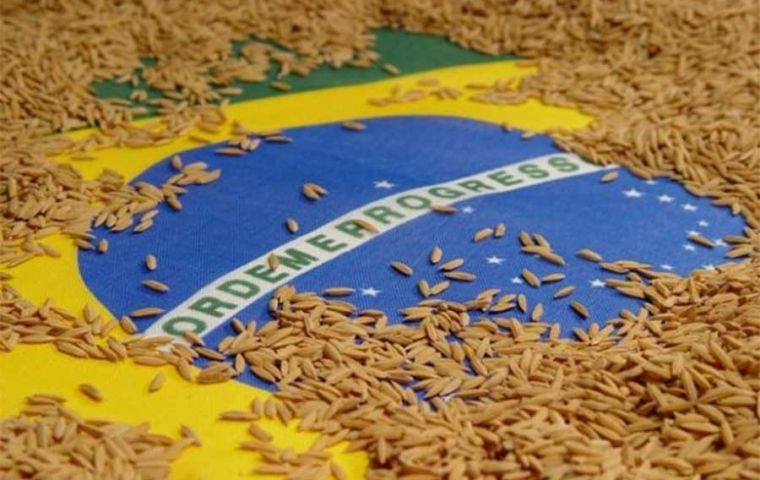MercoPress. South Atlantic News Agency
Brazilian farmers clash with government over the authorization to import rice
 CNA argues that importing rice could destabilize the domestic rice production chain, causing price instability and harming local farmers.
CNA argues that importing rice could destabilize the domestic rice production chain, causing price instability and harming local farmers. Brazilian farmers and government have clashed over the recent authorization to import rice, given the extraordinary floods and consequences suffered by the state of Rio Grande do Sul, the main producer the cereal. As a result of the situation the Brazilian Agriculture and Livestock Confederation (CNA) has filed a lawsuit against the federal government’s decision to authorize rice imports.
The so called Direct Action of Unconstitutionality (ADI) aims to suspend the National Supply Company’s (Conab) first public auction for purchasing imported rice, scheduled for Thursday June 6, and seeks governmental explanations for the measure, reports BroadCast Agro, a radio program that lobbies for farmers.
CNA argues that importing rice could destabilize the domestic rice production chain, causing price instability and harming local farmers. “This decision disregards the grains already harvested and stored and further jeopardizes the savings of rural producers, who are already suffering from the impacts of recent floods,” the CNA stated.
The lawsuit also questions the constitutionality of rice imports, which are outlined in two provisional measures, two inter-ministerial decrees, and a resolution from the Management Committee of the Chamber of Foreign Trade. These rules allow up to one million tons of rice to be imported into Latin America's largest economy.
The CNA points out that 84% of the rice planted in Rio Grande do Sul had been harvested before the onset of the tragic floods and asserted that there is no real risk of a shortage. The entity noted that government measures were enacted “under the pretext of ensuring domestic supply” following the overflows in Rio Grande do Sul.
“Realistic data indicates that the 2023/24 Rio Grande do Sul harvest amounted to approximately 7.1 million tons, close to the 7.239 million tons harvested in 2022/23,” the CNA stated, quoting figures from the state’s Rice Institute (Irga). The CNA criticized the federal government for not consulting Rio Grande do Sul producers before deciding to import rice.
“Neither local unions, the Agriculture Federation of the State of Rio Grande do Sul (Farsul), nor the CNA itself were consulted, despite having relevant insights to offer like data demonstrating no shortage risk. The rice import policy would be disastrous and contrary to market regulations,” the CNA emphasized.
The CNA also sustains that the government’s lack of engagement with the productive sector led to “errors in diagnosing the situation and an inability to identify bottlenecks that really necessitated immediate investments.”
The organization warned that rice imports “violate the Constitution and represent an abusive intervention by the Public Power in economic activity, restricting free competition.” The CNA concluded that “rice produced and harvested by rural producers in Rio Grande do Sul will suffer from predatory competition from foreign rice, subsidized by the federal government and sold in Brazil at prices that do not reflect natural market conditions.”




Top Comments
Disclaimer & comment rulesCommenting for this story is now closed.
If you have a Facebook account, become a fan and comment on our Facebook Page!